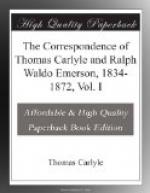--------- * The memory of this Boy, “born for the future, to the future lost;” is enshrined in the heart of every lover of childhood and of poetry by his father’s impassioned Threnody. -----------
Tell Jane Carlyle our sorrowing story with much love, and with all good hope for her health and happiness. Tell us when you write, with as much particularity as you can, how it stands with you, and all your household; with the Doctor, and the friends; what you do, and propose to do, and whether you will yet come to America, one good day?
Yours with love,
R.
Waldo Emerson
LXXIV. Carlyle to Emerson
Templand, Thornhill, Dumfries, Scotland 28 March, 1842
My Dear Friend,—This is heavy news that you send me; the heaviest outward bereavement that can befall a man has overtaken you. Your calm tone of deep, quiet sorrow, coming in on the rear of poor trivial worldly businesses, all punctually despatched and recorded too, as if the Higher and Highest had not been busy with you, tells me a sad tale. What can we say in these cases? There is nothing to be said,—nothing but what the wild son of Ishmael, and every thinking heart, from of old have learned to say: God is great! He is terrible and stern; but we know also He is good. “Though He slay me, yet will I trust in Him.” Your bright little Boy, chief of your possessions here below, is rapt away from you; but of very truth he is with God, even as we that yet live are,—and surely in the way that was best for him, and for you, and for all of us.—Poor Lidian Emerson, poor Mother! To her I have no word. Such poignant unspeakable grief, I believe, visits no creature as that of a Mother bereft of her child. The poor sparrow in the bush affects one with pity, mourning for its young; how much more the human soul of one’s Friend! I cannot bid her be of comfort; for there is as yet no comfort. May good Influences watch over her, bring her some assuagement. As the Hebrew David said, “We shall go to him, he will not return to us.”
I also am here in a house rendered vacant and sacred by Death. A sore calamity has fallen on us, or rather has fallen on my poor Wife (for what am I but like a spectator in comparison?): she has lost unexpectedly her good Mother, her sole surviving Parent, and almost only relative of much value that was left to her. The manner too was almost tragic. We had heard of illness here, but only of commonplace




